

Pedroso proposes a return to the origins of a golden age in the history of his nation, which coincided with Portugal’s presence in Asia. This return was all the more important as part of a kind of national soul-searching, as the country faced up to its scientific and cultural backwardness when compared to its European neighbours, serving as something of an exercise in rationalizing a national identity and history in crisis – or decline. Made popular in the nineteenth century, largely thanks to the works of Alexandre Herculano (e.g. O Bobo, 1843) and Antero de Quental (Causas da Decadência dos Povos Peninsulares [Causes of the Decline of Peninsular Peoples], 1871), the idea of decline would become a running theme in Portuguese orientalism, often being justified as a result of either maritime expansion (Matos, “Oriente e Orientalismo”, 2002, p. 212), or, in the specific case of Portugal’s eastern empire, the actions of the Inquisition (Lopes Mendes, O Oriente e a America, 1892, p. 38). Blame for this decline would also be attributed to Portugal’s defeat at the battle of Alcácer Quibir, which signalled the start of the nation’s waning influence in Africa – a space that had historically served as a geographical intermediary with the East – and symbolized the country’s downfall as a military power (Colaço, ms. Alcacer-Kebir, 1901 [1892]). At the end of the nineteenth century it was this notion of decline which contributed to the idea of a gap between the country’s potential and its performance, or history, between what it had done in the past and what it was at the present moment. At the same time as Portugal was lamenting the loss of its imperial status among its European peers, seeking “only to preserve what remained of its old empire in the Orient” (Catroga, “A história começou a Oriente”, 1999, p. 228), a number of commonplaces characterizing ancient ‘oriental’ civilizations were proliferating in European discourse, including the idea of decline, associated, as in the above citation from Pedroso, with the image of ruin or the remains of a faded glory. In this line of thinking, only the Portuguese explorers of the sixteenth and seventeenth centuries would have been able to witness that glory, which, in the nineteenth century, would be supplanted by European progress, along with the rise of the idea of the inferiority or difference of the non-European, non-Christian Other. To return to Lopes Mendes, “having, in ancient times, walked at the forefront of civilization, India has since let other nations take the lead,” or “the natives of India [...] have not received the influx of European civilization” (O Oriente e a America, 1892, pp. 2, 17).
